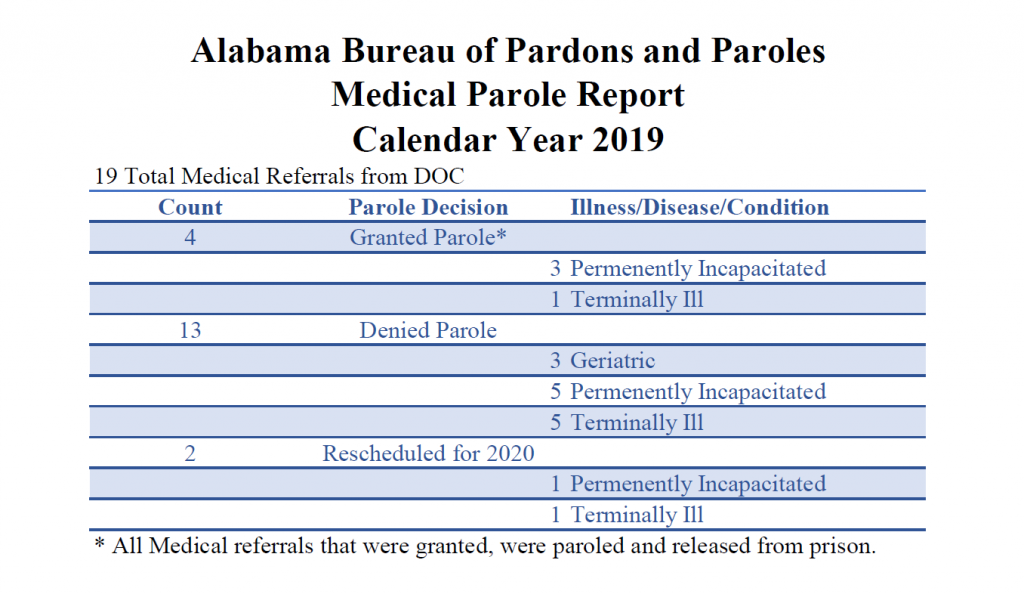Mandatory Release
During its Regular 2015 Session, the State Legislature passed and the Governor signed a law as a part of a comprehensive “prison reform” package (Act 2015-185) that mandated release of offenders from the Alabama Department of Corrections within a certain range of time before the expiration of their sentence. Policymakers sought to reduce recidivism rates by ensuring some period of meaningful supervision for those offenders who, under the prior law, would have been most likely to leave prison with no transitional supervision whatsoever.
This automated release mechanism is initiated by the Department of Corrections and only applies to those inmates with offenses committed on or after January 30, 2016.
Individuals convicted of a sex offense involving a child are excluded as are offenders serving life sentences.
Release of eligible inmates is based upon the length of sentence. The law provides for certain ranges of time for release preceding an individual’s end of sentence:
- For sentences of five years or less, mandatory release is no less than three months and no more than five months prior;
- For sentences of more than five years but less than 10 years, mandatory release is no less than six months and no more than nine months prior;
- For sentences of 10 years or more, mandatory release is no less than 12 months and no more than 24 months prior.
The Department of Corrections determines an inmate’s mandatory release date based on the above statutory ranges and coordinates with the Alabama Bureau of Pardons and Paroles to prepare for release to supervision.
The Bureau is charged with intensively supervising mandatorily released individuals. Intensive supervision includes available programing and treatment resources. Mandatory release cases are also subject to the highest frequency of collateral contacts, i.e., probation and parole field office reports, home visits, employment verifications, etc. By law, the Bureau’s Probation and Parole Officers are limited to having no more than 25 cases at a time supervised at this level.
The state’s mandatory release law is codified as Alabama Code Section 15-22-26.2.
September 30, 2019, Bureau data show a total of 266 active mandatory release cases. This number is projected to continue increasing.
Medical Parole
Alabama Code Section 15-22-43 (enacted in 2017) provides for a special medical parole docket for parole board consideration. This action must be initiated by the Department of Corrections.
To be eligible for medical parole, an Alabama Department of Corrections inmate must otherwise be eligible for initial parole consideration, must not be barred from parole by statute, and must be defined under the law as:
- Geriatric;
- Permanently incapacitated; or
- Terminally ill.
Additionally, an inmate may be eligible for medical parole if he or she is otherwise eligible for initial parole consideration, is not barred from parole by statute, and:
- Has spent more than 30 or more days in an infirmary in the prior calendar year;
- Has received costly and frequent medical treatment outside a Department of Corrections facility in the previous 12 months; or
- Is suffering from a life-threatening illness and whose death is imminent within 12 months.
The Bureau of Pardons and Paroles does not employ doctors. Doctors employed by the Department of Corrections make the necessary medical determinations in medical parole cases as to whether an inmate qualifies as geriatric, permanently incapacitated, or terminally ill as defined by Alabama Code Section 15-22-42 or otherwise meets statutory criteria for medical parole consideration; then, the Department of Corrections sends lists of names of inmates who are potential candidates for medical parole to the Bureau to prepare a medical parole docket for the board. In the event of insufficient information, the board may request additional medical evidence or order additional medical examinations be conducted by the Department of Corrections.
Once an inmate is placed on a special medical parole docket, the board considers the following factors in deciding whether to grant medical parole:
- Risk for violence.
- Criminal history.
- Institutional behavior.
- Age of the inmate, currently and at the time of the offense.
- Severity of the illness, disease, or infirmities and whether the same existed at the time of the offense.
- All available medical and mental health records.
- Reentry plans, which include alternatives to caring for terminally ill or permanently incapacitated inmates in traditional prison settings.
The Bureau is required to provide an annual report on medical parole to the Joint Legislative Interim Prison Committee, House Judiciary Sentencing Commission Subcommittee, and the Alabama Sentencing Commission containing the following information:
- The number of inmates granted and denied medical parole.
- The number of cases granted medical parole, but that could not be released.
- The nature of the illnesses, diseases, and conditions of those paroled.
- The crimes for which the inmates granted and denied medical parole have been convicted.


